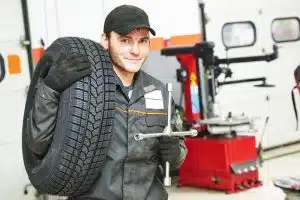 In the UK, there are a number of legal issues that tyre fitters need to be aware of. First and foremost, it is illegal to fit tyres that do not meet the minimum tread depth requirements. This is because tyres with insufficient tread depth can significantly reduce grip and increase the risk of accidents. Secondly, tyre fitters must ensure that all tyres are properly inflated before they are fitted.
In the UK, there are a number of legal issues that tyre fitters need to be aware of. First and foremost, it is illegal to fit tyres that do not meet the minimum tread depth requirements. This is because tyres with insufficient tread depth can significantly reduce grip and increase the risk of accidents. Secondly, tyre fitters must ensure that all tyres are properly inflated before they are fitted.
This is because underinflated tyres can cause premature wear and tear, as well as increase fuel consumption. Finally, it is important to ensure that all tyre fitting work is carried out in a safe and secure manner. This means using the proper tools and equipment, and following all relevant health and safety regulations. By being aware of these legal issues, tyre fitters can help to keep themselves and their customers safe
Tyre fitting businesses must comply with a wide range of laws, so you need to be sure you know as much information as possible. Today we’ll walk you through the main areas you should be on the lookout for.
What licences does a tyre fitter need?
Licensing requirements for tyre fitters or a tyre fitting business do not currently exist. The seller of part-worn tyres may need a second-hand dealer’s license in some places, particularly in Scotland. You can find out more about this by contacting your local authority’s trading standards department.
Mobile tyre fitting or repair services are provided by some tyre fitters using large goods vehicles. You will need a goods vehicle operator’s licence in England, Scotland, and Wales if you wish to operate a large goods vehicle (a vehicle that has a gross plated weight of more than 3.5 tonnes – or a gross unladen weight of more 1,525 kg for unplated vehicles). For businesses that carry only their own equipment and goods, a restricted category license is sufficient.
The Department for Infrastructure (DfI) may require a goods vehicle operator’s licence in Northern Ireland. Drivers must also have the appropriate licenses. The DfI in Northern Ireland and Gov.uk both provide information about goods vehicle operator licensing.
You are required to be regulated by the Financial Conduct Authority (FCA) if your business sells tyre insurance policies (or other insurance policies – such as MOT insurance). It is either essential that your business is authorised by the FCA or that a firm that is authorised is appointed to represent you. There is more information available on the FCA website.
Environmental regulators or local authorities may require permits for the following activities under pollution control legislation:
- A permit is required to operate a waste oil burner (for heating purposes)
- Vehicle refinishing (spray painting)
In order to obtain a permit, you must meet the requirements of your local authority. You can obtain an application form from your local environmental health department.
If you wish to dispose of used tyres, you should use a tyre collector who is registered.
Transporting waste yourself
The certificate of registration as a lower tier waste carrier (or equivalent in Scotland) is required if you plan to transport your own business waste in your vehicles – such as old tyres removed from vehicles by your mobile fitting teams. Environmental Protection Agency in Scotland (SEPA), Natural Resources Wales (NRW), and the Northern Ireland Environment Agency (NIEA). Registration is free.
Hazardous waste producers
Hazardous waste producers must register with Natural Resources Wales if they produce 500kg or more of hazardous waste at their premises in Wales within a 12-month period. Batteries that have been removed from vehicles can be considered hazardous waste. A list of hazardous waste producers can be found on Gov.uk.
Roadside tyre fitters – REACT voluntary licensing
A licence-to-fit scheme has been set up by the National Tyre Dealers Association (NTDA) in response to concerns regarding roadside truck tyre fitters. A licensed REACT fitter is someone who undergoes special safety training and can carry out this type of work. NTDA’s website provides more information about the REACT scheme.
Tyre safety standards
All tyres used on UK roads must comply with specific construction and marking regulations. These standards must be met by all tyres you supply. The British and European standards and legislation must also be followed for retreaded tyres and part-worn tyres. A part-worn tyre’s condition is determined by the amount of tread left and any significant defects. Often overlooked is the need to permanently mark part worn tyres BEFORE they are sold. Repairing punctures properly is also covered by British Standards, so if your tyres get punctured, make sure the repair is done correctly.
If your customers’ tyres are approaching the legal limit, you should also be aware of the minimum tread depth requirements.
Any questions you may have about tyre specifications and marking requirements can be addressed by your local authority’s trading standards department. This can also be handled by reputable tyre suppliers.
Tyre labelling
In addition to the tyres they distribute, manufacturers must include a ‘consumer advice’ sticker. It must include information on fuel efficiency, wet grip, and rolling noise. End users must receive this information from tyreretailers. Visit the National Tyre Distributors Association’s website for more information on tyre labelling requirements.
Hazardous substances
The use, storage, and disposal of hazardous substances in garages are governed by specific regulations. You must minimise the exposure of yourself and your employees to potentially harmful substances. To prevent skin exposure to substances like oil or brake fluid, precautions may be taken such as wearing dust masks and goggles when changing brake components. In addition to storing hazardous substances correctly, they must also be handled carefully.
Disposal of old tyres
It is mandatory to properly dispose of all waste tyres. Licensed waste carriers, such as those registered with the Environment Agency in England and Wales and the Northern Ireland Environment Agency, and the Scottish Environment Protection Agency (SEPA) in Scotland, are the only ones that can take them away and dispose of them. SEPA, the Northern Ireland Environment Agency or the Environment Agency can answer your questions about the authority of a collection firm. Old engine oil or brake fluid, for example, must be disposed of according to similar rules. For more information, please visit the Gov.uk website.
Goods and services – consumer protection
Businesses must comply with a number of laws to protect their customers’ interests. Goods and services should not be described in a misleading manner, for example. It is your responsibility to ensure all parts supplied are suitable for their intended purpose, as well as that the work done is of a satisfactory quality – all repairs should be carried out with care. The website of Trading Standards Business Companion provides more information about consumer protection and fair trading legislation. Alternatively, you can visit Gov.uk for more information.
Parts and repair standards
Car parts and repairs are covered by legislation governing the sale and supply of goods and services. To ensure the safety of future drivers of the vehicle, you must ensure that the correct parts are used and fitted safely.
Health & safety, fire
Complying with workplace health and safety and fire safety legislation is also important.
Employment legislation
Employment legislation must be followed by anyone who employs staff. There are several important areas of legislation, including:
- Recruitment and employment contracts
- Pay and pensions
- Working time: hours, leave, flexible working
- Employment policies
- Sickness and sick pay
- Maternity, paternity and adoption
- Discrimination
- Managing home workers, remote workers, lone workers
- Discipline and grievance
- Dismissals and redundancies
- Employment tribunals
Insurance for a tyre fitter
A business owner must have insurance coverage when he or she starts up. Describe your business plan to an insurer. Depending on your situation, they may recommend the following coverage:
- Employer’s liability
- Public liability
- Product liability
- Motor trader’s insurance, to cover you and your staff when you’re driving customer’s vehicles – and to cover customers’ vehicles when they’re on your premises
- Premises, premises contents and stock
- Cash
- Business interruption
- Motor insurance (for parts collecting vehicles, mobile tyre fitting van)
A number of insurers have negotiated special rates for the National Tyre Distributors Association (NTDA).
Conclusion
Tyre fitters and tyre fitting businesses need to be aware of a number of legal issues they are likely to come across during their daily trade. These include employment issues, holding the correct insurance if you employ staff and operate vehicles. The maintenance of equipment as well as the sale of tyres on finance. Should customers also be allowed into the working area, you need to ensure you hold public liability insurance, and have safeguarding in place to protect them against injustice to prevent any future legal issues against the tyre fitter or business.
Lee Jones is a seasoned Business Finance Specialist with over two decades of invaluable experience in the financial sector. With a keen eye for market trends and a passion for helping businesses thrive, Lee has become a trusted advisor to countless organizations seeking to navigate the complexities of finance.


